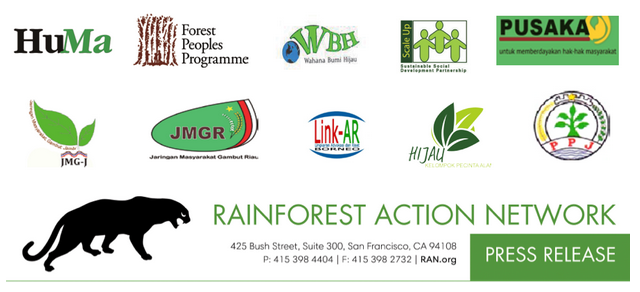On-the-ground interviews with 17 affected Indonesian communities reveal policy implementation problems while hundreds of unresolved land conflicts remain

FOR IMMEDIATE RELEASE
CONTACT: Laurel Sutherlin, 415 246 0161, laurel@ran.org
San Francisco, CA – A field-based survey to investigate Asia Pulp and Paper’s (APP) performance, provide input into an evaluation of APP’s progress on fulfilling its social responsibility commitments, and make recommendations to the company finds little on-the-ground evidence to date that APP is taking sufficient action to resolve land conflict issues.
With the exception of progress in two communities where it is piloting conflict resolution approaches, there has been little change for communities embroiled in land disputes with the company. Hundreds of land conflicts remain and APP has been failing to involve affected communities and other key stakeholders in the identification, analysis and resolution of these conflicts.
The study, which was initiated by a coalition of Indonesian and International NGOs and community-based organizations, conducted interviews with village leaders and community members from 17 communities impacted by APP and its affiliates. Communities were visited in the Indonesian provinces of Riau, Jambi, South Sumatra, West Kalimantan and East Kalimantan between May and September 2014, including visits to three APP concessions where the company has initiated conflict resolution pilot projects.
APP’s 30-year legacy of adverse social and environmental impacts from its widespread deforestation and pulp plantation expansion across Indonesia is well documented. Following decades of public criticism, community opposition and pressure from its customers and investors, in February 2013 APP announced a much-welcomed new Forest Conservation Policy, which sets out the companies commitments to reform its forestry practices and to address its legacy of land grabs and human rights violations, climate pollution, deforestation, and wildlife habitat destruction across its 2.6 million hectares of concessions.
The study is a contribution towards ongoing independent monitoring of the company’s performance. The study was submitted to an evaluation of APP’s progress against its Forest Conservation Policy Commitments being conducted by the Rainforest Alliance.
Commenting on the coalition’s findings, Patrick Anderson from Forest Peoples Programme said:
“APP still has a tremendous amount of work to do before we can say that their commitments are yielding satisfactory remedies to conflicts on the ground. We’re very concerned that at least one of the the two land conflict agreements that have been reached did not follow all the requirements in APP’s policy on respecting community rights and that there are many hundreds of conflicts with communities remaining to be resolved. APP is still failing to effectively involve communities and other key stakeholders in developing action plans and efforts to scale up its conflict resolution. If the situation doesn’t change, we’re concerned that the company’s efforts will not secure durable and equitable agreements at scale.”
Aidil Fitri, campaign director at Wahana Bumi Hijau stated that “our research on APP’s implementation of its Free, Prior and Informed Consent (FPIC) commitment relating to the new Oki Pulp Mill, one of the world’s largest, finds that the company has not gotten FPIC from at least one rights holding community and that the company has started construction of Oki Pulp Mill before the FPIC process was completed. We see this as a clear violation of FPIC and the company’s own policy.”
“If APP wants to regain the trust and business of customers and investors, it must improve transparency, work more effectively with stakeholders and prove that it has sufficiently implemented its commitments to a point where it can demonstrate widespread and positive impacts on the ground,” said Lafcadio Cortesi of Rainforest Action Network. “Because the company’s implementation is still at an early stage, there is a clear need for continued independent monitoring and verification of the company’s performance. In order for APP to scale up conflict resolution and prevent further deforestation in the remaining natural forests in their concessions, the company will need to give back more of the land it is currently using for pulp wood plantations to meet community livelihood needs and land claims.”
“Our report provides detailed recommendations for how APP can address current problems and how it can ensure that the foundation that it has established leads to positive outcomes for communities and forests and delivers the results it has promised. The study suggests to buyers and others that it’s still too soon to tell whether APP’s promises will become a reality,” Cortesi said.
The full report, available to download here, includes a table outlining the research findings from each community, and the executive summary and recommendations, available to download here, provides an overview of the full report’s findings and detailed recommendations of improvements APP can make.
For a Bahasa Indonesia translated version of this press release, download one here:
###
Rainforest Action Network runs hard-hitting campaigns to break North America’s fossil fuels addiction, protect endangered forests and Indigenous rights, and stop destructive investments around the world through education, grassroots organizing, and non-violent direct action. For more information, please visit:www.ran.org